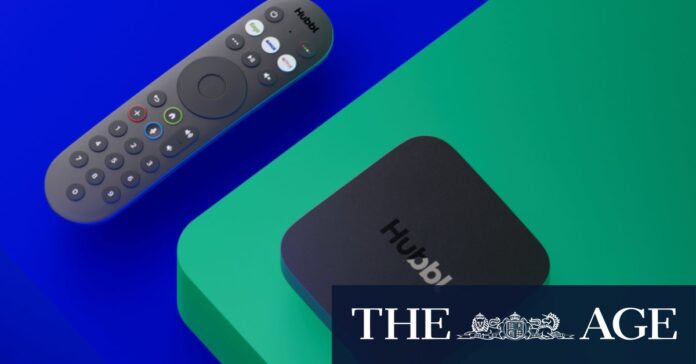[ad_1]
The slightly tortured streamlining is common to systems that try to pool everything together, like Google or Fetch TV. Still, Hubbl does a better job than most at trying to highlight new content from all sources, rather than just the stuff from the company that owns it.
The Netflix-style motion posters you see when the device is idle are quite equitable, even promoting new episodes of big shows from free-to-air. Although, if you only subscribe to one of the many premium offerings, that could get a bit annoying.
Compared to Hubbl, Apple TV, Fetch Mini and Amazon Fire Cube all also offer cross-app search and have access to more apps, but they’re more expensive at around $200.
The Fetch Mighty, which is more than $300, also has a hard drive for recording broadcast TV. Only the Fetch and Hubbl options have a plug for your terrestrial antenna, which is handy, and helps Hubbl stand out as an easy all-in-one at a low price.

Hubbl Glass is bulky compared to other TVs, with the larger model coming in at 35kg, but it has a built-in 3.1.2 sound system.
Similarly, the Hubbl Glass represents great value for anyone wanting a new 4K TV, smart software features and good sound all in one sleek package. Coming in at less than $2000, it offers great picture quality compared to the mid-range Samsung and Sony LCDs you’d get for the same price, and you likely won’t need an additional soundbar or extra speakers, given the Glass’ hefty in-built sound. You don’t need any kind of additional set-top box either, since the Hubbl is built-in.
Loading
Like an iPhone or a Samsung Galaxy, Hubbl Glass comes in an array of colours: Anthracite Black, Ocean Blue, Racing Green, Dusky Pink, and Ceramic White.
Built-in Dolby Vision and HDR 10 mean that 4K shows like Shogun and True Detective: Night Country pop off the screen, and the Glass is also always listening, meaning you can say “OK Hubbl” at any time, and it will play whatever you ask it to. This is a feature that, thankfully, you can switch off. The remote has a microphone button you can hold to search with your voice instead.
The Glass – like the set-top box – is still somewhat of a work in progress, and we can expect additional features to be added over time. For example, while plugging in a Playstation works (and looks great), the Glass doesn’t recognise it as Playstation like other TVs do, instead merely labelling it as HDMI1.
Some of the limitations might also frustrate more demanding users: you’re unable to “cast” or stream content from your phone or laptop, for example – a feature available on most other smart TVs – and while it features three HDMI 2.1 ports, it doesn’t have a high refresh rate like others in its price class. We also found the Amazon Fire Stick didn’t quite fit into the space afforded for the Glass’ HDMI port. Then again, more discerning TV tech-heads will probably opt for the Hubbl puck on their own TV.
Overall, everything about the Hubbl Glass has been built with simplicity in mind, making it a compelling choice for anyone overwhelmed by the multitude of streaming options available, and anyone just wanting a good value TV without worrying about bits and bobs to go with it.
Get news and reviews on technology, gadgets and gaming in our Technology newsletter every Friday. Sign up here.
[ad_2]
Source link


